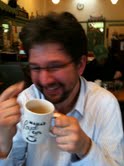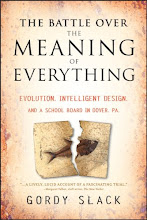 |
| The Being Human conference took place in San Francisco on March 24, 2012. |
The leitmotif was an exploration (and, frankly, a celebration) of the bi-directionality of the mind-body connection. Eagleman talked about how much of what we consider conscious directed behavior is actually driven by unconscious forces "hidden under the hood." Ekman, famous for creating a taxonomy of human facial expressions, and the world's authority on deceit, discussed 1) the human propensity to lie, 2) our ineptitude for lying, and 3) our even greater ineptitude for lie-detection in others. "Detecting the lies of others," he points out, "can come at a great cost." We lie to each other, he said but we also lie to ourselves about the lies of others. Sound like the ingredients for the Buddhist notion of dukkha, or the suffering characteristic of the unenlightened life?
Ramachandran insists that the importance of mirror neurons, or "Ghandi neurons," as he calls them, has not been exaggerated by popular neuroscience but is still, "if anything, underplayed" in its importance. He gave a captivating talk about Complex Regional Pain Syndrome, in which the body's haywire response to pain caused by a hairline fracture in a person's hand can lead to stroke-like symptoms in their brain.
Ramachandram, a red blooded materialist and no mystic, was asked if mirror neurons could explain the telepathy-like shared experience of people meditating together. He said simply, No. But then went on to describe a meeting he's had with a Tibetan monk in whose presence he immediately felt almost unbelievably happy, hopeful, and light. It was a profound experience, Ramachandran said, and he thought it was probably explicable at least partly through a mirror neuron-induced empathy response the the monk's own blissful state of mind.
My guard snapped back up in the final afternoon session (the Just Chill must have warn off) as the explicitly Buddhist-meditation-practice agenda came out of the closet when Tibetan lama, Galek Rimpoche presented. He was certainly likable enough, but his message was vague and off putting in this context. He did not know much about science, he acknowledged, but he was more and more certain that it was all confirming the Buddha's teaching. Maybe so, but Galek Rimpoche was certainly not prepared to prove it. And without some kind of validation, it gave the conference a kind of evangelical flavor reminiscent of another science-religion forum I'd attended. When I covered the opening of the Creationism Museum in Kentucky for Salon.com, Ken Hamm, the evangelical leader of that stupefying testament to self-deception, tried to unify the messages of science and religion by proclaiming that it was high time to show that "every word of the Bible can be defended by modern science." Holy cow! Are we deceiving ourselves, others, or both when we try to contort the conclusions of science back into the shapes of religious relics?
Maybe it would be nice for some if Buddhism and neuroscience were complementary, and it probably is. But it's goofy, or much worse, to suggest they are the same thing.


1 comment:
I attended this conference too and didn't find that it had an "evangelical" flavor of Buddhism as you suggest, until the very end. The science stood on its own and it included some of the leading thought in neuroscience - that is separate from how the day was packaged by those who support Buddhism. But, you could have attended the conference and come away with untainted and fascinating survey of brain research. Perhaps you a wee jaded? Not sure.
Post a Comment